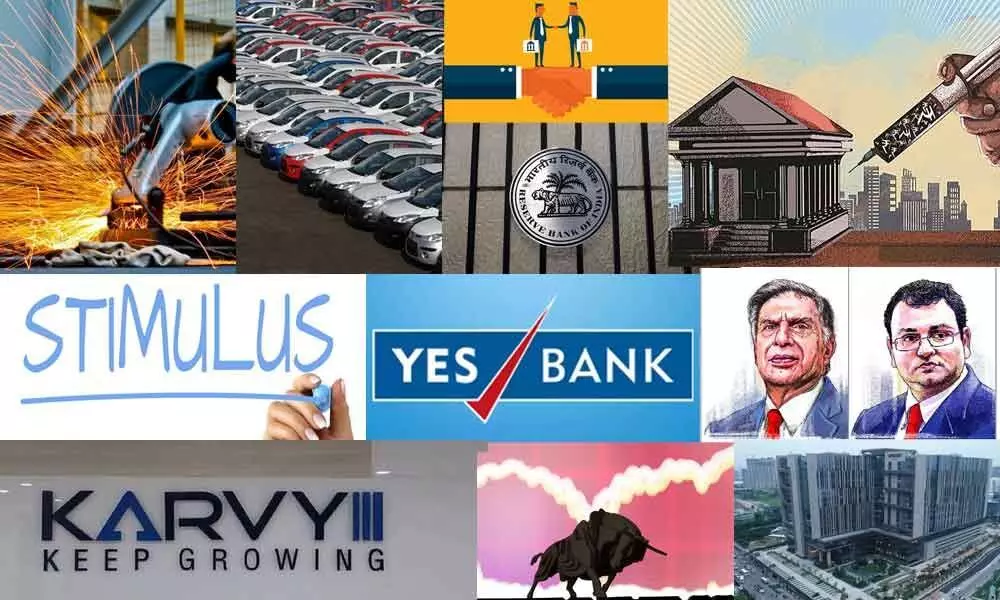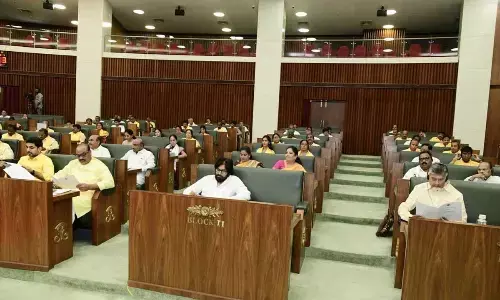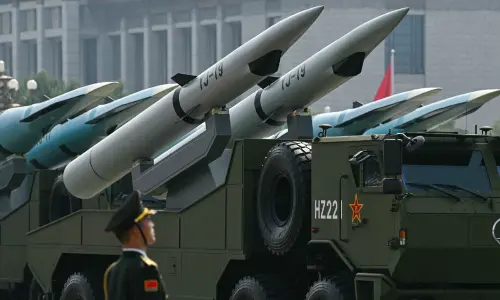Economy falters... Auto sector sputters

In early 2019, the government defined a startup as an entity that has been in operation for up to 10 years from its date of incorporation.
Startups: From policies to unicorns
In early 2019, the government defined a startup as an entity that has been in operation for up to 10 years from its date of incorporation. Besides, this year, the government also exempted Angel Tax for DPIIT registered startups.
Commerce and Industry Minister Piyush Goyal in a Lok Sabha session said, as of November 2019, there are 25,115 recognised startups in India.
The Startup India initiative, which was set up to help startups get funding in early stage, has released Rs 700 crore of its Rs 10,000 crore corpus since its inception three years ago.
Close to Rs 696 crore has been drawn from the SIDBI Fund of Funds, the Minister said. The other initiatives include notifying startups as 'Fast track firms,' and rebate granted in the patent application and filing fee.
In 2019, few startups joined the unicorn club, such as Ola Electric, BigBasket, Rivigo, Delhivery, Dream11, and Druva. In the most funded startups, Paytm tops the list, which received a total funding of over $3.5 billion, followed by, Ola with $3.28 billion and Oyo Rooms with $3 billion.
On the investment front, Bollywood actors joined the wagon as investors, including names like Deepika Padukone, Akshay Kumar, Aishwarya Rai Bachchan and Arjun Kapoor.
The startup ecosystem also witnessed M&A activity. According to a report, a total of 86 acquisition deals took place till November 2019.
AP's Rs 15k-crore steel plant
On December 23, Andhra Pradesh Chief Minister Y S Jagan Mohan Reddy laid the foundation stone for establishing a high-grade steel plant at Sunnapurallapalli village in his native Kadapa district.
The Rs 15,000-crore plant with a three-million-tonne capacity per annum is expected to provide jobs to about 25,000 people and will be completed in three years.
It will come up in 3,295 acres near Jammalamadugu. Noting that there was a huge gap between demand and availability of steel in the country, Jagan said at the foundation-laying ceremony that the Kadapa plant would be a great contribution to the sector.
A week before this ceremony, the AP government signed signed a memorandum of understanding with the NMDC for supply of about five million tonnes of iron ore for the steel plant every year.
Not just decision-making, but also ideas and plans emanate from a small set of personalities around the Prime Minister and in the Prime Minister's Office.
That works well for the party's political and social agenda, which is well laid out, and where all these individuals have domain expertise. It works less well for economic reforms
– Former RBI Governor Raghuram Rajan
Sangita Reddy, new Ficci president
On December 23, 2019, Sangita Reddy the joint Managing Director of Apollo Hospitals Group, took over as the president of Ficci (Federation of Indian Chambers of Commerce & Industry) for 2019-20.
She succeeds Sandip Somany, Vice-Chairman and Managing Director, HSIL. "I look forward to an incredible year for Ficci and for the country.
At our just finished 92nd AGM, we have laid out a roadmap. While we discussed on various issues, the most important takeaway is that everybody is moving ahead with a sense of commitment on how to make it happen," Reddy said.
No liberty to criticise Modi govt
During the UPA era, people had liberty to criticise the wrong policies of the government.
But now people are afraid to utter a word against the government. They don't know if you will appreciate the criticism
Rahul Bajaj, Chairman, Bajaj Group
No link between GDP, markets
There are lots of other things I do not understand such as financial markets in India.
I hope that the first behavioural economics project of this Centre (IIM-A) would be to explain to me why as the economy is going down and down and down, while the stock market is going up, up and up.
If you can crack this puzzle for me, I would fly down here all the way from the US to understand it."
Arvind Subramanian, former Chief Economic Adviser
GDP in slow lane in 2019 despite stimulus steps
India's economy painted a disappointing picture in 2019, to say the least. The economy began 2019 on a sombre note with GDP registering 5.8 per cent growth during January-March 2019.
The reading was 0.5 per cent lower than the preceding quarter when GDP recorded 6.3 per cent upswing. Further, it was for the first time that economic growth slipped to below six per cent.
However, slowdown in GDP growth did not stop. The growth fell to 5 per cent, a six-year low, during April-June period.
Interestingly, the country went to nationwide polls during this three-month period and the Narendra Modi government retained power at the Centre with an increased tally of 303 MPs.
That means slowing economy has not impacted electoral fortunes of BJP and its national leadership.
Worried over deceleration in GDP growth, Modi 2.0 government announced several stimulus measures including cut in corporate tax.
But these measures failed to fuel economic growth with GDP growth further slowing down to 4.5 per cent in July-September quarter.
Macroeconomic indicators point to much slower growth during October-November months. Will 2020 be a better time for India's economy? Going by the current trends, it's very unlikely that GDP growth will pick up in near term.
Industrial output declines
Reflecting slowdown in economic growth, industrial output, measured as index of industrial production (IIP) contracted during the most part of this calendar year.
The key index slipped into negative territory when it contracted by 0.1 per cent in March 2019. Incidentally, it recorded a growth of 0.1 per cent in February and 1.7 per cent in January.
In October for which data is available now, industrial production shrank for third consecutive month in October by 3.8 per cent, mainly due to output fall in manufacturing, mining and electricity sectors.
The factory output declined by 4.3 per cent in September and 1.4 per cent in August this year, while it grew at 4.9 per cent in July.
During April to October, the IIP growth remained almost flat at 0.5 per cent compared to 5.7 per cent in same period previous fiscal.
Auto sector in doldrums
The Indian automobile sector went through a prolonged slump in 2019. During the April-November period, the sector registered a fall of 16 per cent in volumes to 15.7 million units as per data from the industry body SIAM.
Passenger vehicle sales fell for 11 consecutive months till September, only to rise marginally in October on the back of festive season purchases and new model launches.
The sector registered sales decline in November. In the wake of sales slowdown, automakers cut production, leading to huge job losses.
RBI cuts repo rates
The Reserve Bank of India (RBI) accepted the recommendations of the Bimal Jalan committee and agreed to transfer Rs 1.76 lakh crore for 2018-19 to the government from its reserves.
This gave a major boost to the government's coffers that were already constrained. Both parties were fighting over the level of reserves that RBI was supposed to keep for contingencies.
RBI had cut repo rates by a total of 135 basis points in 2019, in order to boost economic growth and increase liquidity.
The policy rates are at a decade low of 5.15 per cent. In the last policy meet in early December, the central bank took a pause recognising rising inflation.
Bank mergers
The NDA government initiated an extensive consolidation of Public-sector banks (PSBs) that will see 10 of them being merged to form four bigger lenders to strengthen a sector struggling with bad-loan cleanup and aimed at creating lenders of global scale.
The latest consolidation move will slash the number of state-owned lenders to 12 from 27 in 2017
Recapitalisation of banks
Sitharaman in Budget-2019 said the government will infuse Rs 70,000 crore into public sector banks (PSBs) in 2019-20 to strengthen and enhance their lending capacity.
Over the last five financial years (FY15 to FY19), PSBs have been recapitalised to the extent of Rs 3.19 lakh crore, with an infusion of Rs 2.5 lakh crore by the government and the mobilisation of over Rs 66,000 crore by PSBs themselves, according to the data presented in the Lok Sabha.
Stimulus
After a series of announcements to revival economic activity in 2019, the Centre is expected to unveil another does of stimulus in the coming Budget-2020.
However, IMF cautioned India against another round of stimulus. Earlier on August 26, the FM announced changes in administrative and taxes in view of the slowdonw.
fiscal space to counter cyclical stimulus didn't exist. The corporate tax for large corporates lowered from 30 per cent to 25.17 per cent and new companies, set up after October 1, 2019, and should commence production by March 2023, from 25 per cent to 17.01 per cent.
The tax concessions would cost the Centre Rs1.45 lakh crore.
On September 1, 2019, the FM Nirmala Sitharaman announced a slew of measures to boost sagging exports and a stressed real estate sector.
These sops will have a total impact of more than Rs 60,000 crore on the exchequer.
YES Bank
From the status of being darling of the investors to dropped from the Sensex pack, Yes Bank in 2019 witnessed the melting down of its success story.
The scrip of India's fourth largest private lender is down 72 per cent year-to-date to 10-year low. First Rana Kapoor was denied another term as CEO of the Yes Bank by the RBI.
Following that, every other financial institution that failed this year, YES Bank found itself embroiled in it. Its exposure to bad loans, especially in the real estate sector plagued its investors as the stock was hit hard.
The relentless selling by promoters also didn't help the stock. The recent highest was Rs393.20 on August 17, 2018. Its 52- week high was Rs286 and low was Rs29.
The share price dwindled down from Rs280.30 on April 2, to the lowest of Rs32 on October 1 and later recovered to the present Rs51 level.
Mistry vs Tata: Fight for the right continues
On December 18, 2019, National Company Law Appellate Tribunal (NCLAT) reinstated Cyrus Mistry as the Executive Chairman, ruling the appointment of N Chandrasekaran as illegal.
It also directed the Registrar of Companies (RoC) to reverse Tata Sons status from a private company to a public company.
On October 24, 2016, Mistry was abruptly ousted from the post of Executive Chairman of the $111-billion Tata Group.
Several of Mistry's decisions as chairman of the Group, did not go down well with Tata Trusts.
RoC recently sought for deletion of the words - illegal and 'with the help of the RoC used by the NCLAT in its recent order.
Meanwhile, the Group is considering the possibility of approaching the Supreme Court on the matter.
Karvy & its clients in crisis
The second half of 2019 witnessed outburst of financial misuse of investors' securities at Karvy Stock Broking Ltd.
The Hyderabad-based stock broking firm on November 22 lost its broking licence over Rs2,800 crore fraud as pegged by the market regulator Sebi.
Karvy has pledged the securities of its investors deposited in the DP account and took loans worth over Rs2,800crore for its own use.
EY India is conducting a forensic audit on behalf NSE. Sebi says Karvy channelled the loan amount into real estate business. Out of the total 12 lakh cclients, about three lakh are active, while on average 25,000 trade daily.
Banks request Sebi to give them ownership of pledged securities. But Sebi may not agree on this as the securities are of investors.
If it does so, then investors at the losing end. Securities Appellate Tribunal (SAT) directed NSDL to hold back remaining stocks belonging to clients of Karvy.
Lately, Axis Bank, one of the lenders to Karvy, moved SAT against the decision of NSDL and Sebi as they decided to transfer pledged shares to beneficiaries.
SAT has reserved its order. "We modify our order on December 17 and asked Sebi to pass an appropriate orders on the representation of the appellant on or before January 15,2010," said SAT.
Irrational boom in stock markets
BSE Sensex began 2019 trading at 36,254.57 points on January 1, and trading at 41,441.20 points on December 24. The year-to-date (YTD) gain was 5,186.63 points or 14.30 per cent in 2019 so far.
NSE Nifty took off 2019 trading at 10,910.10 points on January 1 and trading at 12,197 level as on December 24. The YTD gain was 1.287.45 points or 11.80 per cent.
Mostly, IL&FS, NBFCs, corporate tax cut, Yes bank PNB and RIL kept investors alert and gave a mixed bag of returns in 2019.
About 45 stocks lost in the range of 50-95 per cent during the year. BSE Mid-cap fell 19 per cent and small cap dropped by 34 per cent.
Included Reliance Capital, Reliance Communications, DHFL, Reliance Infrastructure, Jet Airways, Reliance Power, Jain Irrigation and Coffee Day Enterprises.
Sensex recorded its lifetime intra-day high of 41,719.29 and closing record of 41,673.92. The NSE Nifty also touched its new peak of 12,259.70.
Amazon's largest campus in Hyderabad
Amazon, an e-commerce giant on August 21, 2019, formally opened its largest campus building, a facility spread over nine acres and comprising three million sft of built up area.
The new campus is Amazon's first owned office building outside the US and is the single largest building globally.
The office space of 1.8 million sft can seat 15,000 professionals, out of which 4,500 are already working out of the facility.
Amazon has over 60,000 employees in the country, one third of the employees are housed in Hyderabad.
Software development engineers, machine learning scientists, product managers, finance and others involved in various functions will be based out of the campus.








